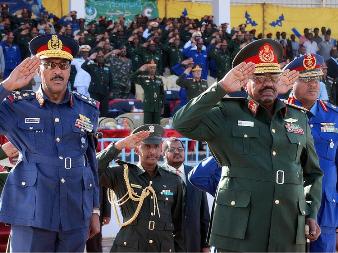EXCLUSIVE: Sudan army officers warn Bashir & Hussein against rush to war with south
January 29, 2012 (KHARTOUM) – A group of 700 military officers from Sudan’s Armed Forces (SAF) confronted president Omer Hassan al-Bashir and his defence minister Abdel-Rahim Mohamed Hussein with several demands that focused on military and political reforms, Sudan Tribune has been told.

The message was delivered last week to Bashir and Hussein during their briefing sessions with SAF senior army officers who listened to the pair calling on them to prepare for the possibility of a full-scale war with South Sudan.
But the sources said that the SAF officers at the briefing were all but appalled at the prospects of heading to war with Sudan’s southern neighbour given the state of the military at this point.
The officers called on Bashir and Hussein to urgently address the challenges faced by the SAF emphasising that the army has been unable to decisively overcome the rebels in the border states of Blue Nile and South Kordofan.
The Sudanese army has been battling rebels from the Sudan People Liberation Movement North (SPLM-N) in the two states since June 2011 in South Kordofan and September 2011 in Blue Nile. Khartoum persistently accuses Juba of providing aid to the rebels but South Sudan routinely denies the charge.
This week the second vice-president of Sudan, Al-Haj Adam Youssef was quoted by local media as threatening to go after SPLM-N rebels even if they had to go all the way to Juba.
“If necessary, Juba is not far,” he told a newspaper during celebrations of Sudan’s independence in the central state of Al-Jezira.
SAF needs “tremendously huge efforts” in order to prepare for future dangers particularly at a time when there is talk about foreign intervention, Bashir and Hussein were told.
The officers also urged Bashir and Hussein combat “rampant” corruption within the army and gave an example of 200 battle tanks that were bought in early 2010 but most of it turned out to be defective and a large number had to be sent to neighbouring countries for repairs.
They noted that several senior officers objected to the “subpar deal” involving these tanks before they were bought which led to the sacking of Hussein’s chief secretary Major General Al-Na’eem Khidir and other senior officers including Major General Ahmed Abdoon who headed the Nyala army division and Major General Al-Tayeb Mosbah of El-Fasher army division.
The SAF officers also implored Bashir and Hussein to implement segregation between the ruling National Congress Party (NCP) and the army so that the latter does not shoulder the mistakes of the NCP and become vulnerable to volatility of the Sudanese politics.
Furthermore, they said that is imperative that the system of government be reformed because the status quo jeopardises the country’s national security.
One of the sources underscored that the current political climate in the form of tensions between the Islamists and the NCP has spread into the army but declined to provide details.
He described Bashir and Hussein as “rattled” by the officers’ complaints.
Eric Reeves, a researcher at Smith College who writes extensively on Sudan, believes oil is a major factor in this move.
“This may well be a dismayed response to the clear possibility that Khartoum never wanted to make a deal about oil revenues with Juba. Rather, the goal was to create a casus belli, by which the army would seize the oil regions of the South and restore all oil revenues to a northern economy that continues in a politically dangerous tailspin” he said.
This month a number of memos have surfaced allegedly sent by the Islamist base calling on the NCP to implement political reforms and fight corruption.
One of them was presented in late 2011 by Bashir’s adviser Ghazi Salah al-Deen in his capacity as the leader of the NCP parliamentary bloc.
The Sudanese president responded vaguely to some of the demands contained in Ghazi’s memo while saying that it is “premature” to address the others.
Sudan is facing a growing economic crisis that was aggravated by the secession of the oil rich south which took with it 75% of the country’s crude reserves.
Since then, Sudan’s oil revenues, which used to make up 90 percent of the country’s exports and were the main source of hard currency inflows, have largely dried up.
The government has already banned many imported items to preserve its foreign currency supply.
The Sudanese pound lost a significant amount of its value against the dollar as a result and the black market has flourished despite government warnings.
Khartoum is trying to walk the fine line between the need to cut government spending and cutting subsidies on basic goods and petroleum products which they fear might trigger social unrest.
Last year the governor of Sudan’s central bank Mohamed Khair al-Zubeir said that fuel subsidies need to be removed because they are a huge burden on the economy.
“Subsidies are a big burden for the state. The biggest subsidy is for fuel,” al-Zubeir said, adding that a barrel of fuel was sold locally at $60 compared to a market price of $100.
“So far we didn’t notice the difference, subsidies were no problem because the country had oil … [but] we cannot pay this any more,” he added.
The landlocked South Sudan has been in talks with Khartoum on the fair fee that should be assessed for using the north’s refineries and pipelines. It has been reported that Sudan asked for $32 per barrel for the service, something which South Sudan vehemently rejected saying it is excessive compared to international norms.
Sudan retaliated to the slow pace of talks and decided to seize part of South Sudan’s oil as payment in kind for the exporting service. Juba responded by shutting down its oil production.
(ST)
